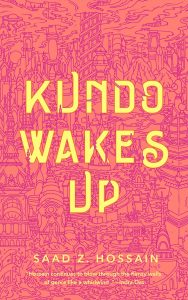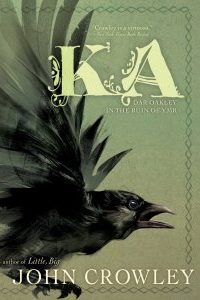Gary K. Wolfe Reviews Kundo Wakes Up by Saad Z. Hossain
 Kundo Wakes Up, Saad Z. Hossain (Tordotcom 978-1-250-82392-2, $15.99, 208pp, tp) March 2022.
Kundo Wakes Up, Saad Z. Hossain (Tordotcom 978-1-250-82392-2, $15.99, 208pp, tp) March 2022.
Saad Z. Hossain’s Kundo Wakes Up returns us to the uniquely original vision of a future South Asia plagued by environmental disaster, swarming with airborne nanotech, governed by mostly benevolent AIs, and occasionally plagued by rogue djinns, that we first encountered in The Gurkha and the Lord of Tuesday back in 2019. Even one of his most engaging characters from both that novella and last year’s Cyber Mage, a punk teen who calls herself KPopRetroGirl (or ReGi), shows up again, now promoted to both a duchess and a sheriff in the service of Karma, the AI which has turned Kathmandu into a sort of tech paradise. Kundo Wakes Up, though, begins with a more traditional mystery and develops a more linear narrative than those previous works. It takes place far from Kathmandu, in the coastal city of Chittagong, which is gradually being inundated by the Bay of Bengal and whose own AI seems to have taken a hike, or at least become largely unresponsive. Kundo is a burnt-out, reclusive, once-famous artist whose wife, an enthusiastic gamer, left him nearly two years earlier, who comes to suspect that her disappearance involves more than just getting fed up with the marriage.
Kundo’s venture outside to begin his investigation takes him first to a curry cart downstairs from his apartment, where the owner makes a cryptic remark about the coming of the Egyptian god Horus, “our savior.” Later he learns that an acquaintance, a hacker named Hassem, has also disappeared, leaving behind a note that suggest he might know what happened to Kundo’s wife. Kundo persuades Hassem’s landlady Fara, also a gamer, to help him pursue the mystery, and later seeks the assistance of elderly merchant Hafaz, in the early stages of Alzheimer’s, and a former coder and addict named Dead Gola, so called because she was illegally revived from an overdose and hence is invisible to the city’s AI. Later on, ReGi joins them as part of her own investigation – it turns out there are a lot more disappearances–which leads them to the widely popular game Final Fantasy 9000 or FF9000 (also from Cyber Mage) and to something far more ominous, called the Black Road, which can only be accessed from within FF9000. Will Hossain’s missing-persons mystery finally resolve itself in terms of the increasingly immersive online metaverse of the gamers, or reveal the intervention of supernatural figures like djinns, or that ancient Egyptian god Horus, or both?
Kundo Wakes Up is fully as entertaining as we’ve come to expect from Hossain, though I suspect there are quite a few allusions to actual games that sailed right by me (though a helpful footnote does tell us that FF9000 is made up of parts of Grand Theft Auto, Red Dead, and Final Fantasy). The setting, with its encroaching seas and atmosphere polluted by hazardous nanoparticles, is even more unsettling than in the earlier stories, since unlike Kathmandu, Chittagong is on the verge of being given up as a lost cause by its own local Karma AI, and we see a good deal more of those segments of society left behind in new economy, in which Karma points replace currency – resulting, inevitably, in an entire class of “zeroes” with essentially no resources at all. That somewhat darker vision, together with a bit more attention to plotting and a genuine interest in the individual lives of his cast of mostly outsiders – the elderly, the addicted, the burned out – may not be quite as much fun as The Gurkha and the Lord of Tuesday, but it helps make Kundo Wakes Up Hossain’s most mature and unified book to date.
Gary K. Wolfe is Emeritus Professor of Humanities at Roosevelt University and a reviewer for Locus magazine since 1991. His reviews have been collected in Soundings (BSFA Award 2006; Hugo nominee), Bearings (Hugo nominee 2011), and Sightings (2011), and his Evaporating Genres: Essays on Fantastic Literature (Wesleyan) received the Locus Award in 2012. Earlier books include The Known and the Unknown: The Iconography of Science Fiction (Eaton Award, 1981), Harlan Ellison: The Edge of Forever (with Ellen Weil, 2002), and David Lindsay (1982). For the Library of America, he edited American Science Fiction: Nine Classic Novels of the 1950s in 2012, with a similar set for the 1960s forthcoming. He has received the Pilgrim Award from the Science Fiction Research Association, the Distinguished Scholarship Award from the International Association for the Fantastic in the Arts, and a Special World Fantasy Award for criticism. His 24-lecture series How Great Science Fiction Works appeared from The Great Courses in 2016. He has received six Hugo nominations, two for his reviews collections and four for The Coode Street Podcast, which he has co-hosted with Jonathan Strahan for more than 300 episodes. He lives in Chicago.
This review and more like it in the March 2022 issue of Locus.
 While you are here, please take a moment to support Locus with a one-time or recurring donation. We rely on reader donations to keep the magazine and site going, and would like to keep the site paywall free, but WE NEED YOUR FINANCIAL SUPPORT to continue quality coverage of the science fiction and fantasy field.
While you are here, please take a moment to support Locus with a one-time or recurring donation. We rely on reader donations to keep the magazine and site going, and would like to keep the site paywall free, but WE NEED YOUR FINANCIAL SUPPORT to continue quality coverage of the science fiction and fantasy field.
©Locus Magazine. Copyrighted material may not be republished without permission of LSFF.






